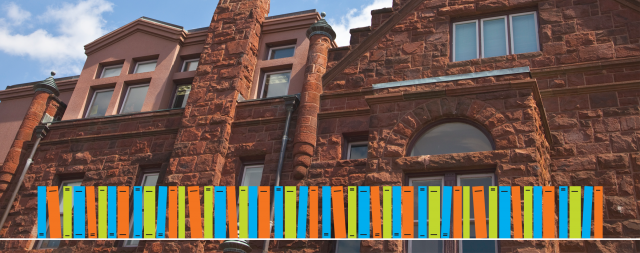

Lab English Teachers
Lab’s Magnificent House of English
High School English Teachers Marla Brazier, Lauren Jacob, Jennifer Sherman, and Tim Wetsell certainly know a thing or two about the power of stories. Each year, Lab’s High School “House of English” gives great thought to the books they choose for their classes and in what context they will present them.
Why We Choose the Books We Choose
“After nourishment, shelter, and companionship, stories are the thing we need most in the world.” So asserts Author Philip Pullman. Why is this true for so many of us? Is it that stories make us feel less alone? Is it that they fire up our sense of fairness, outrage, humanity? Or — aside from the joy of escaping onto myriad landscapes beyond our own — is it that stories simply nurture the empathy and thoughtfulness in each of us?
Persevering in the Face of Adversity
In her classes, Ms. Brazier focuses on books with characters who persevere in the face of great struggle. There is Sherman Alexie’s The Absolutely True Diary of an Indian, William Kamkwamba’s The Boy Who Harnessed the Wind, and Elie Wiesel’s famous Night. “These books include big, important topics like the Holocaust and the crippling effects of racism. Being a teacher of literature means being a history teacher of sorts, too … you can’t teach Night for example, if the students have little or no knowledge about the rise of Nazism,” she says. “I spend a lot of time choosing books in which the characters face obstacles or feel marginalized. We have had books that include American Indians, African Americans, Jews, immigrants, women in the 1920-1930s, transgender people, and one book in which there was a blind character. These books not only contribute to Lab’s school-wide mission around Diversity, Equity, and Inclusion, but they also encourage students to walk in the shoes of others, if only metaphorically.”
Delving into the Many Layers of the Human Condition
Similarly, but from a different perspective, Ms. Jacob’s students read and write about the human condition. Whether teaching Mary Shelly’s Frankenstein, Beowulfnon-fiction essays like Gloria Anzaldúa’s “How to Tame a Wild Tongue” about language and identity, or poetry like Adrienne Rich’s unsettling and thought-provoking poem “Cartographies of Silence,” Ms. Jacob endeavors to create a framework so students can digest the material and relate to the characters, stories, and time periods from their modern point of view. “From these texts, we discuss such questions as Does the human condition exist? How does it affect and link us? How do most human experiences — no matter how diametrically different — become shared experiences? says Ms. Jacob. “I am often awed by the insights and connections my students make between literature and real life.”
Reflecting on History’s Role in the Present
In Ms. Sherman’s class, students focus on themes and issues like race, war, and gender in collaboration with the aligning history taught in High School History Teacher James Bullock’s class. This year, Ms. Sherman’s students began with the stunning new novel, There, There by Tommy Orange about the painful clash of belonging and not belonging. Covering the Harlem Renaissance, Jim Crow and the Great Migration, and repression of women in Victorian times, the class reads a variety of poems, essays, and short stories, including James Baldwin’s “My Dungeon Shook,” Shmuel Goldman’s “The Pogroms Were All Around Us,” and Tillie Olsen’s “I Stand Here Ironing” to name a few. “In class and in assignments, we grapple with some tough ideas,” says Ms. Sherman whose students last year synthesized what they had learned in the creation of short films instead of traditional written essays. “It’s interesting to see the progression of thought and maturity from a ninth grader to that of a junior or senior. They become far more active and courageous in their reading, writing, and thinking.”
Exploring the Nuances of Dystopian Worlds
“What do people need from their society to feel empowered and affect change?” This question is the central theme in Mr. Wetsell’s English classes as is “What kinds of choices can individuals or societies make when faced with a questionable government mandate or corporate takeover?”
This year, his students are exploring these questions around the texts of George Orwell’s Animal Farm, Kurt Vonnegut’s satirical and dystopian science-fiction short story “Harrison Bergeron,” Dave Eggers’ recent novel The Circle, and Ray Bradbury’s chilling and prophetic novel Farenheit 451. “Some of these books are dark, novels my students might not choose to read on their own, but they are invariably thought-provoking,” says Mr. Wetsell. “It’s exciting to see my students start to connect the thematic breadcrumbs I have been laying out with each piece of literature, question characters’ motives and choices, and from there bring these insights into their own life and times.”
Showing What You Know
How is all this possible when, for many Lab students, reading and writing are often two of their greatest learning challenges? Because at Lab, teachers like Ms. Brazier, Ms. Jacob, Ms. Sherman, and Mr. Wetsell know how to help their students succeed by teaching them how they learn best. They know reading, writing, and thinking analytically are crucial skills, but they also understand that there is more than one way to skin that poor, proverbial cat.
“We know that the practice of reading creates cognitive engagement that prompts improvement on many levels, including vocabulary, thinking skills, and concentration. Reading can also affect empathy, social perception, and emotional intelligence. All important skills.” says Ms. Sherman.
But reading and understanding what you read doesn’t always have to translate into a person sitting quietly with a book or scratching a pencil against paper. It can mean reading aloud in a group, listening to an audio text, acting out sections of a text theatrically, creating a rap about that text, a soundtrack, a photo essay, a painting. These are just some of the ways students in Lab’s House of English delve into a text and share what they know with their teachers and peers.
So, stories…. We read them. We listen to them. We write them and we tell them in order to find ourselves in them, to feel less alone, and to breath in a world of possibilities.


